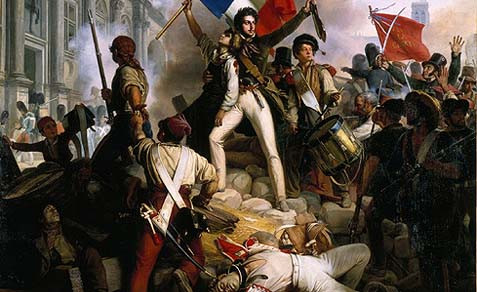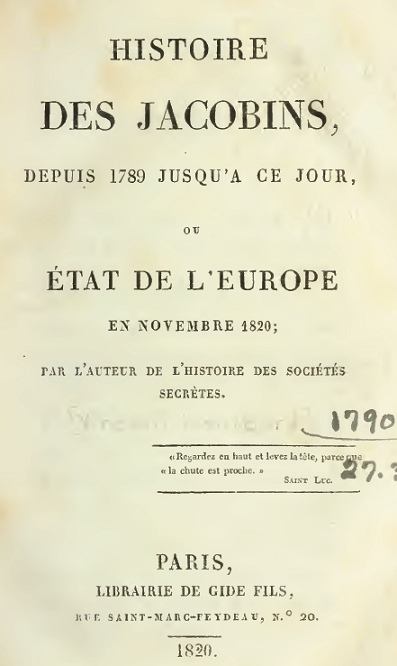Were Illuminati Jews Behind French Revolution?
July 13, 2014

"Behind the Convention, behind the clubs, behind the Revolutionary Tribunal, there existed, says Lombard de Langres Vincent - (author of Histoire des Jacobins depuis 1789 jusqu'à ce jour (1820) and l'Histoire des sociétés secrètes,) that 'most secret convention [convention sécrétissime] which directed everything after May 31, an occult and terrible power of which the other Convention became the slave and which was composed of the prime initiates of Illuminism."
THE JEWS, THE MASONS AND THE FRENCH REVOLUTION
by Vladimir Moss
(Excerpted by henrymakow.com)
The early phase of the revolution - that of the constitutional monarchy and the Declaration of the Rights of Man - was led by the more idealistic kind of Freemasons. But its later stages were controlled by the Jacobin-Illuminati with their radically destructive [Cabalist and terrorist] plans.
Thus, "according to Lombard de Langres [writing in 1820]: 'France in 1789 counted more than 2,000 lodges affiliated to the Grand Orient; the number of adepts was more than 100,000. The first events of 1789 were only Masonry in action. All the revolutionaries of the Constituent Assembly were initiated into the third degree. We place in this class the Duc d'Orléans, Valence, Syllery, Laclos, Sièyes, Pétion, Menou, Biron, Montesquiou, Fauchet, Condorcet, Lafayette, Mirabeau, Garat, Rabaud, Dubois-Crancé, Thiébaud, Larochefoucauld, and others.'
"Amongst these others [continues Nasta Webster] were not only the Brissotins, who formed the nucleus of the Girondin party, [including] the men of the Terror - Marat, Robespierre, Danton, and Desmoulins.
"It was these fiercer elements, true disciples of the Illuminati, who were to sweep away the visionary Masons dreaming of equality and brotherhood....
 "Yet faithfully as the
Terrorists carried out the plan of the Illuminati, it would seem that
they themselves were not initiated into the innermost secrets of the
conspiracy. Behind the Convention, behind the clubs, behind the
Revolutionary Tribunal, there existed, says Lombard de Langres, that
'most secret convention [convention sécrétissime] which directed
everything after May 31, an occult and terrible power of which the
other Convention became the slave and which was composed of the prime
initiates of Illuminism. This power was above Robespierre and the
committees of the government,... it was this occult power which
appropriated to itself the treasures of the nation and distributed
them to the brothers and friends who had helped on the great
work.'"[36]
"Yet faithfully as the
Terrorists carried out the plan of the Illuminati, it would seem that
they themselves were not initiated into the innermost secrets of the
conspiracy. Behind the Convention, behind the clubs, behind the
Revolutionary Tribunal, there existed, says Lombard de Langres, that
'most secret convention [convention sécrétissime] which directed
everything after May 31, an occult and terrible power of which the
other Convention became the slave and which was composed of the prime
initiates of Illuminism. This power was above Robespierre and the
committees of the government,... it was this occult power which
appropriated to itself the treasures of the nation and distributed
them to the brothers and friends who had helped on the great
work.'"[36]
What was this occult power that controlled even the Illuminati? Many writers think that it was the Talmudists, the rabbinic leaders of the Jewish people. However, the final triumph of the Talmudists was delayed temporarily by an excess of the revolutionary zeal they had themselves stimulated.
NAPOLEON, INHERITOR OF THE REVOLUTION
By the end of the eighteenth century, the revolution appeared to have lost its way, consumed by poverty, corruption and mutual blood-letting. It was saved by a young soldier, Napoleon Bonaparte, who was as sincerely faithful to the spirit of the French revolution as Cromwell had been to the English.
The Mason Christopher
Hodapp writes: "It was rumoured for many years that Napoleon
Bonaparte was a Freemason, but there is no historic proof of it.
Still, many of his military officers, members of his Grand Council
for the Empire, and 22 of the 30 Marshals of France were. So were his
four brothers, three of whom were made kings by Napoleon. The
Emperor's wife, Empress Josephine, was even admitted into a French
female lodge in 1804. Regardless of whether Napoleon was ever made a
Mason, he did adopt the title Protector of Freemasonry, along with
the lengthy list of other titles he assumed when he became emperor in
1804."[38] ...
Madame de Staël called him Robespierre on horseback. After all, he came from Corsica, which in 1755 had successfully rebelled from Genoa, and for which Rousseau wrote one of his most seminal works, Project de constitution pour la Corse, in 1765. But, like Cromwell (and Caesar), he found that in order to save the republic he had to take control of it and rule it like a king.
 (Can there be any doubt he was a Mason?)
(Can there be any doubt he was a Mason?)
His chance came on 19 Brumaire (November 10), 1799, when he overthrew the Directory, describing parliamentarism as "hot air", and frightened the two elective assemblies into submission. On December 13 a new constitution was proclaimed with Bonaparte as the first of three Consuls with full executive powers. And on December 15 the three Consuls declared: "Citizens, the Revolution is established upon its original principles: it is consummated..."[39]
Paul Johnson writes: "The new First Consul was far more powerful than Louis XIV, since he dominated the armed forces directly in a country that was now organized as a military state. All the ancient restraints on divine-right kingship - the Church, the aristocracy and its resources, the courts, the cities and their charters, the universities and their privileges, the guilds and their immunities - all had been swept away by the Revolution, leaving France a legal blank on which Bonaparte could stamp the irresistible force of his personality."[40]
But, again like Caesar and Cromwell, he could never confess to being a king in the traditional sense. Under him, in Norman Davies' phrase, "a pseudo-monarchy headed pseudo-democratic institutions."[41]......
He was, like many a tyrant, utopian in his ambitions. 'We must have a European legal system, a European appeal court, a common currency, the same weights and measures the same laws,' Napoleon once said to Joseph Fouché: 'I must make of all the peoples of Europe one people, and of Paris, the capital of the world.'"[54]
And yet "at bottom," as Johnson notes, "Bonaparte despised the French, or perhaps it would be more exact to say the Parisians, the heart of the 'political nation'. He thought of them, on the basis of his experience during the various phases of the Revolution, as essentially frivolous."[55]
The truth is, therefore, that it was neither the State nor the Nation that Bonaparte exalted above all, - although he greatly increased the worship of both in later European history, - but himself. So the spirit that truly reigned in the Napoleonic era can most accurately be described as the spirit of the man-god, of the Antichrist, of whom Bonaparte himself, as the Russian Holy Synod quite rightly said, was a forerunner.
This antichristian quality is most clearly captured in Madame De Staël's characterization: "I had the disturbing feeling that no emotion of the heart could ever reach him. He regards a human being like a fact or a thing, never as an equal person like himself. He neither hates nor loves... The force of his will resides in the imperturbable calculations of his egotism. He is a chess-master whose opponents happen to be the rest of humanity... Neither pity nor attraction, nor religion nor attachment would ever divert him from his ends... I felt in his soul cold steel, I felt in his mind a deep irony against which nothing great or good, even his own destiny, was proof; for he despised the nation which he intended to govern, and no spark of enthusiasm was mingled with his desire to astound the human race..."[56]
Related- How the Jews Outwitted Napoleon
First Comment from David;
I believe Napoleon was a tool of freemasonry and that it was a mason, that is obvious, however my understanding is that he tried to install the old monarchy money system against the new rising money lending Rothschild syndicate... There is many quote from him that back his vision of a sound money system independent from the interest bearing currency ; the French Napoleon gold currency and the bimetalic system was stable for over a century (until WWI...)
Napoleon was the last great champion of the common people against the growing
power of finance, as even a superficial study of his Continental System will show. The
hostile forces that ringed him round and finally brought him to ruin were financed by
usury; and, Wellington among them, were fighting usury's battle.
It cannot be too strongly insisted that finance and not territorial aggrandizement is the
key to Napoleon's reign. Had the French Emperor consented to abandon his financial
system in favour of the system of London - that is, in favour of loans by the money
market, he could have had peace at any time.
Having made peace with the whole world, Bonaparte set about his task of preparing himself and the French people for the return to the God-system. It was ordained by him that money should not be exported from France on any pretext whatever except with the consent of the Government, and that in no circumstances should loans be employed to meet current expenditure whether civil or military.
The object was to withhold from finance the power to embarrass the Government as it had embarrassed the Government of Louis XVI. When a Government, Bonaparte declared, is dependent for money upon bankers, they and not the leaders of that Government control the situation, since "the hand that gives is above the hand that takes"57. He did not allow anyone to forget the shipments of gold to England organized by Barras at the expense of the army of Italy, and at a moment when France was denuded of metallic currency. "Money," he declared, "has no motherland; financiers are without patriotism and without decency: their sole object is gain."







Pierre said (July 14, 2014):
Robespierre (I think, from Nesta Webster's book) was trafficking counterfeit currency from London and spraying it throughout the streets, which sounds fairly Rothschild to me. The Bel Air and Palais Royale were dens of vice, the latter having a tiered layer (inner sanctums) which little doubt Napoleon did not venture into. (I would be looking for Italian Proto Cabonari or Jesuit influences at his mothers end).
I came across this resource today searching (to do a propper job one would need to learn French, German, Italian, Hebrew). The fifth page here has the relevant era of the above article referencing the Encyclopaedia Judaca 1971.
http://www.geschichteinchronologie.ch/eu/F/EncJud_juden-in-Frankreich05-revolution-u-Napoleon-ENGL.html
I wonder if the Talmud as well as the Torah was found in the bust ups....not the sort of thing one would want out in the open when the State is actively abolishing 'religions'. How ironic that we found out about the Bavarian Illuminati when one of its couriers was struck by lightening. It's can't be easy being a covert dissembler.